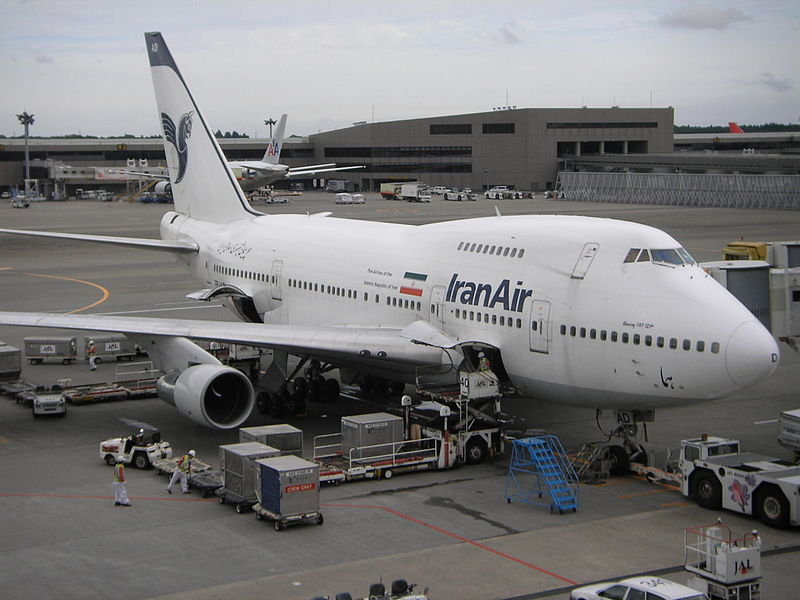Iran remains a hot button issue for the West, although the situation has been very slowly deflating. Many public and private companies alike make disclosures in filings with the U.S. Securities and Exchange Commission (SEC) and with other regulatory bodies regarding future dealings with Iran. Boeing Co. (NYSE: BA) filed its 10-Q (quarterly report) with the SEC after its formal earnings release much earlier Wednesday morning. It signaled a preliminary agreement with a subsidiary of Iran Air for the potential sale of goods and services.
Before you think this is something way off base or out of the norm, firms are now required to file what appears as an “IRANNOTICE” filing with the SEC. Keep in mind that this is not meant to hint that any illegal business is taking place. In fact, back on April 4, 2014, came word that the U.S. Treasury had granted licenses to Boeing and General Electric Co. (NYSE: GE) to sell parts to Iran to service its aging civilian air fleet as part of an interim agreement over Iran’s controversial nuclear program.
Boeing had filed that application earlier this year. Boeing’s IRANNOTICE filing said:
Pursuant to Section 219 of the Iran Threat Reduction and Syria Human Rights Act of 2012 and Section 13(r) of the Securities Exchange Act of 1934, as amended, notice is hereby provided that The Boeing Company has made disclosure pursuant to such provisions in its Quarterly Report on Form 10-Q for the quarter ended June 30, 2014, which was filed with the U.S. Securities and Exchange Commission on July 23, 2014.
ALSO READ: If Iran Isn’t Building an Aircraft Carrier, Then What Is It Doing?
The previous filing, the 10-Q, listed the data as follows:
Section 219 of the Iran Threat Reduction and Syria Human Rights Act of 2012 and Section 13(r) of the Securities Exchange Act of 1934, as amended (the “Act”), require disclosure of certain activities, transactions or dealings relating to Iran that occurred during the quarter covered by this report. Disclosure is required even if the activities, transactions or dealings were conducted in compliance with applicable law.
During the second quarter of 2014, Boeing entered into an agreement and engaged in related discussions with Iran Air pursuant to a license from the U.S. Office of Foreign Assets Control (“OFAC”). The agreement sets forth general terms and conditions with respect to the potential sale of certain goods and services related to the safety of flight, including airplane parts, manuals, drawings, service bulletins, and navigation charts and data. Boeing also engaged in discussions pursuant to the OFAC license with Iran Air Tours, a subsidiary of Iran Air, with respect to the sale of similar goods and services. Boeing applied for the OFAC license consistent with guidance from the U.S. Government in connection with ongoing negotiations between the “P5+1” nations and Iran related to, among other things, the safety of Iran’s civil aviation industry. Boeing generated no gross revenues or net profits during the second quarter in connection with these activities.
Dow Jones covered a story back in November of 2013 that Western firms were in fact eager to return to doing business with Iran amidst relaxed sanctions against it. At that time, their report indicated that Iran urgently needed aviation products from the West. The nation’s air fleet of more than 150 jets from Airbus, Boeing and other plane makers consisted largely of outdated models with an average fleet age of more than 20 years.
We do not yet have any real predictions about how much Boeing and others could win in additional business from Iran. We have seen estimates that the total first wave of post-sanctions business opportunities could be well over $5 billion, but that was covering multiple industries rather than just the civilian aerospace opportunity.
ALSO READ: 10 Countries Spending the Most on the Military
In short, it does not look as though Boeing had generated business with Iran in the second quarter. Whether that remains the case going forward is another matter. Boeing shares were down about 2.5% at $126.52 in early afternoon trading, after the company’s earnings report.
Get Ready To Retire (Sponsored)
Start by taking a quick retirement quiz from SmartAsset that will match you with up to 3 financial advisors that serve your area and beyond in 5 minutes, or less.
Each advisor has been vetted by SmartAsset and is held to a fiduciary standard to act in your best interests.
Here’s how it works:
1. Answer SmartAsset advisor match quiz
2. Review your pre-screened matches at your leisure. Check out the advisors’ profiles.
3. Speak with advisors at no cost to you. Have an introductory call on the phone or introduction in person and choose whom to work with in the future
Thank you for reading! Have some feedback for us?
Contact the 24/7 Wall St. editorial team.




